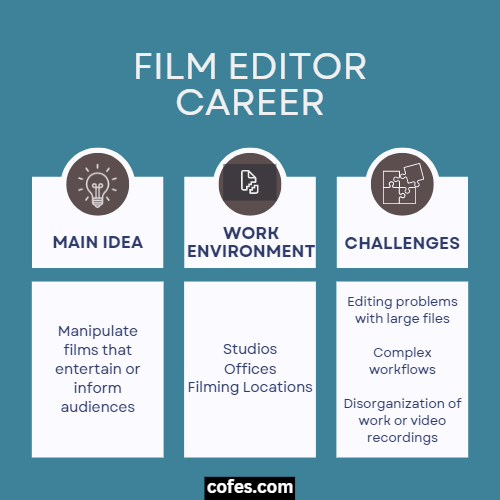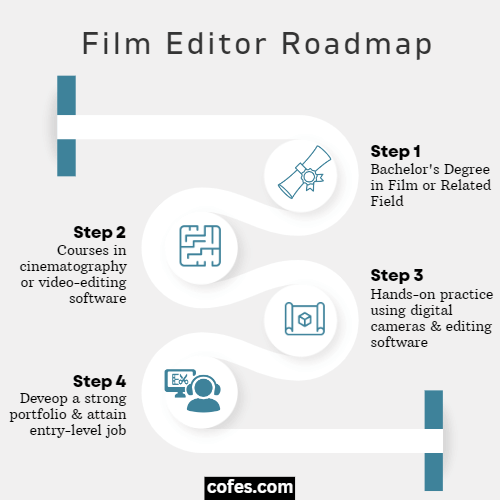Film Editors are responsible for ensuring the final video or film project comes out as planned.
Between editing film, editing soundtracks, and adding graphics and special effects, Film Editors have their plates full every day.
If you love film and if you have a creative mind, a job as a Film Editor could be just right for you!
Film Editor Job Information
| Official Job Title | Film Editor/Video Editor |
| Average Salary | $50,795 |
| Stress Level | Above Average |
| Work/Life | Average |
| Job Satisfaction | Above Average |
| Career Advancement | Average |
Film Editor Job Description
What is a Film Editor?
Film Editors take raw footage and edit the footage to help create a quality film in the end.
Film Editors can work on TV shows, movies, advertising, and online productions.
Film Editors will edit footage, work with supervisors or directors to ensure the footage looks how it should, and suggest editing techniques to the team.
What Does a Film Editor Do Daily?
Each day might be different for a Film Editor, but everyday tasks include visiting filming sets, trimming segments of footage, reviewing and managing footage, meeting with directors, sound technicians, and sound effects editors, and other duties.

Responsibilities, Duties & Roles of a Film Editor
Overall, Film Editors are responsible for editing film in a way that fits the director’s vision for the project.
They will use specialized film editing techniques to create a quality film masterpiece.
Film Editors are not responsible for the completion of the film, but they are an essential step in the process of movie and video making because editing and reviewing projects can only make them stronger!
Editing is one of the most critical processes in filmmaking.
Common Film Editor duties include:
- Creating voiceover text for film
- Preparing and managing storyboards
- Cutting video sequences
- Editing audio
- Setting up and operating editing software
- Reviewing final edits
- Collaborating with the film team
Film Editor Salary
Average Salary
Payscale.com reports an average salary of $50,795 per year for Film Editors.
Starting Salary
Salary can vary based on the company, but the average entry-level salary for a Film Editor is $41,076, according to Zip Recruiter.
Senior Salary
The national average salary for a Film Editor is $82,018, according to Glassdoor.com.
How to Become a Film Editor
The Entry Level: Certification, Training & Degree
For any Film Editor job, candidates must have a bachelor’s degree in broadcasting, film production, or video production.
Some students go on to graduate school in film or video production or another specialized field, but most jobs will require at least a bachelor’s.
Most positions do not require any type of graduate degree, but if you want to specialize in your field, it’s good to consider.
Most Film Editors will complete an internship during their undergrad and graduate studies so they can get their ‘foot in the door’ within the video and film industry.
All training will most likely be learned during college, but there will also be opportunities to learn every day in your career as a Film Editor.
Other Skillsets, Requirements & Qualifications
Film Editors will be expected to know common film editing software like Adobe Premiere Pro, Final Cut Pro X, CyberLink PowerDirector, Avid, AutoDesk Smoke, EDIUS, and others.
Common certifications held by Film Editors usually certify them in video editing software.
If you want to boost your resume, consider becoming Apple Certified in Pro – Final Cut Pro X or an Avid Certified Operator.
How Long Does It Take to Become a Film Editor?
Becoming a film Editor should only take four to five years, which includes training, college, and internship experiences.
If you decide to pursue an MFA or other graduate degree, it could take up to 6 years.
Is It Hard To Become a Film Editor?
When it comes to training and coursework, some aspects may be a little difficult to learn, but overall, it’s easy to become a Film Editor.
It’s not too difficult to learn the techniques behind video editing and film editing, but there may be a lot of competition for jobs, making it harder to become a Film Editor.
To stand out from the competition, create a solid resume, do mock interviews, and be ready to talk about your editing skills.
Film Editor Career Paths
The Film Editor Roadmap
Before you become a Film Editor, you may have to take entry-level positions like editing assistant or post-production assistant to earn the experience for a Film Editor position.
Some companies may hire you directly for a Film Editor role.
Experienced Film Editors may transition into a Senior Film Editor position or other positions within the film industry, like producer or director.

Projections for Growth in Film Editors
The U.S. Bureau of Labor Statistics states there will be a 12 percent growth in Film Editor job openings through 2031, which is faster than average.
Great news if you are looking into this career!
In Summary: Is a Film Editor a Good Career?
Film Editors may not make a large sum of money each year, but most people who enter the field do it because they are creative and love working with video footage.
If you are passionate about creativity, filming, or videos, becoming a Film Editor is a great choice, especially since jobs will grow soon.
Film Editor Work Conditions
Can a Film Editor Work Remotely From Home?
Depending on where you work, yes.
Many film editors will probably work in an office to easily collaborate with their team members, but many people also work as freelance Film Editors.
In this case, they will probably be working remotely.
How Many Hours Does a Film Editor Work?
Normally, Film Editors will work a set schedule of 40 hours a week.
But Film Editors may need to work more than 40 hours a week to meet important deadlines.
Can a Film Editor Work Part-Time?
Depending on the project, yes.
Smaller film and video projects may require a Film Editor only to work 15 to 20 hours a week. A larger project will require a full-time Film Editor.
What are the Average Vacation Days for a Film Editor?
Normally full-time Film Editors receive holidays and two weeks of paid vacation time.
Alternative Careers & Similar Jobs to a Film Editor
- Film Producer
- Director of Photography
- Multimedia Artist
- Sound Engineer
- Camera Operator
- Screenwriter
- Content Creator
- Web Designer
- Communications Director
- Public Relationship Manager
Film Editor Resume Tips
Besides including your relevant work history, educational history, and skillsets, it’s good to include a professional summary at the top of your resume.
Write a short paragraph about what you bring to the table as a Film Editor.
It’s also a good idea to create a creative, visual resume.
Film Editors work in a creative field, so their resumes should reflect that.
Use a simple graphic program like Canva.com or Adobe InDesign to create a professional, but creative resume.
Highlight any previous video editing or film editing projects you have worked on.
Including a hyperlink on your resume or even a QR code that leads hiring managers to your online portfolio is a good idea, showcasing your editing and film work.
Film Editor Interview Questions
Q1: What would you do if a client or supervisor was not pleased with your work?
Why It Works: Employers will see how you handle stressful and unpleasant situations in the workplace.
Q2: Which one of your previous projects (if any) do you consider your best work and why?
Why It Works: Employers want to know more about you and your experience in film editing, and how you take on projects.
Q3: What film editing software are you familiar with?
Why it Works: Employers will want to know if you have a basic grasp of video editing software and if you have any of the software they use.
Q4: How do you stay up-to-date with the latest trends in film and video?
Why It Works: The film and media industry is constantly changing.
Employers will expect you to stay up-to-date with any current trends.
Q5: Describe an experience where you had to work under pressure and on tight deadlines.
Why It Works: Many Film Editors will have to work quickly but efficiently on their projects.
Employers will want to know if you can handle stress and pressure well because it is a part of the job.
Jobs Related to Film Editor
Interested in other film industry careers?
Similar jobs include:
- Camera operators
- Sound technicians
- Audio-visual specialists
- Editors
- Photographers
- Graphic Designers
- Directors
- Scriptwriter
- Animators
- Producers
For HR Managers: Tips for Hiring a Film Editor
Key Characteristics to Look for in a Film Editor
Film Editors should be able to handle a lot of work on tight deadlines, stress, and constructive feedback.
People who can work in teams and have patience with others could also do well in a FIlm Editor environment.
Other basic characteristics should include attention to detail, excellent communication skills, and great computer skills.
Minimum Level of Education & Experience
Potential candidates should have at least a bachelor’s degree in a relatable field, like broadcasting or video production.
Depending on the seniority of the position, the candidate won’t need much experience to start besides what they learned in college.
